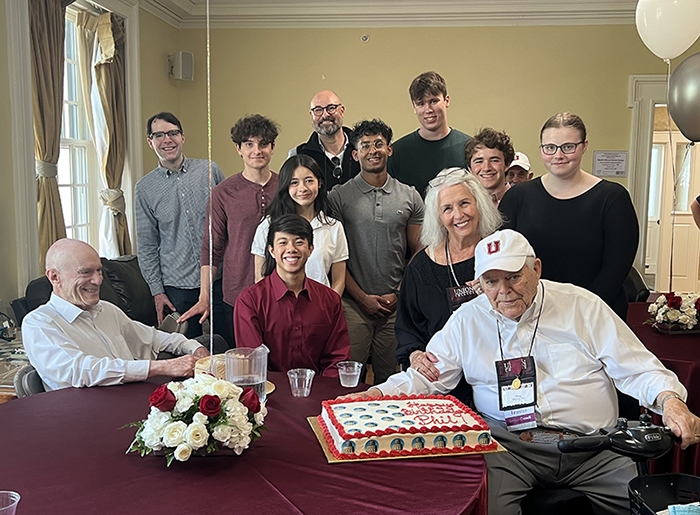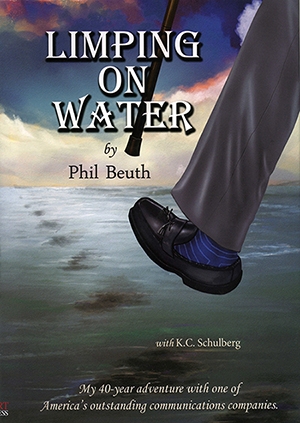Member of the Class of 1954 and television pioneer Phil Beuth is being honored for his dedication to career and community.
This fall, he will receive the inaugural Service to the Community Award from the Broadcasting + Cable Hall of Fame. And this summer, he was featured in the documentary, “WTEN-TV 70th Anniversary ... A Look Back,” for his role in the Albany (N.Y.) station’s beginnings.
Philanthropy and business have always been equally important to Beuth. He’s lived by the words, “when you do well, you should do good.”
Why? Because his life was changed by people who believed the same.
Beuth credits the kindness of others for the “big breaks” that have made him who he is --professionally and personally.
Career & Big Breaks
Beuth’s first big break came when he was 17.
A family friend arranged for him to meet Union trustee Frank Bailey in the financier’s Manhattan office to discuss the possibility of Beuth attending the College. Throughout his life, Bailey generously gave scholarships to many young men (Union did not admit women until 1970).
“I shined my shoes and was very nervous, but I remember Mr. Bailey greeting me and almost singing, ‘So you want to go to Union? Come along with me,'” Beuth said. “During our conversation I said I was proud to be thinking of college, but I didn’t have any money – only $40 saved.”
Beuth grew up in a working-class neighborhood on Staten Island. After his father died when he was four, he and his brother were raised by their mother, a “very strong woman” who taught Beuth “to walk and be honest and principled.” (Beuth was born with a mild form of cerebral palsy.)
Shortly after the meeting with Bailey, Beuth received a scholarship to Union. Once in Schenectady, he studied English, though he likes to say his major was really “growing up 101.”
“I was the most naive, uninformed person,” Beuth said, “but I went from Dick Tracey to Henry Thoreau.”
Indeed, Beuth excelled in his studies, as he did in his pursuit of professional development.
On campus, he worked at the Rathskeller while tirelessly, but respectfully, badgering the station manager at Schenectady’s WRGB until he was hired as a page.
“The manager said, ‘I’ve never had anybody so persistent. We need somebody like you,’” Beuth recalled. “I loved it and I worked ‘till midnight and then walked all the way home to Union.”
“Pretty soon, I became well known and was allowed to learn to work the cameras and sit with directors,” he continued. “I learned so much and was spoiled rotten.”
When Beuth graduated, GE executive Robert Hanna (GE owned WRGB then) gave him his second big break -- a scholarship to attend Syracuse University and earn a master’s in television management. Once he had that degree in hand, Hanna told a man named Thomas Murphy about Beuth.
Thomas Murphy, who founded communications giant Capital Cities and retired as CEO of Capital Cities/ABC, hired Beuth sight unseen in 1955 to help launch the station that would become WTEN.
Being WTEN’s first employee was big break number three.
For the next 42 years, starting with WTEN, Beuth helped Murphy grow Capital Cities and turn it into a communications juggernaut. Through it all, Beuth eagerly tried his hand at everything in the emerging television industry – film director, public affairs, producer, promotion manager, sales manager.
In the late-60s, he was named vice president and general manager for the Capital Cities affiliate in Huntington, W.V. In 1971, he became president and general manager of KFSN TV in Fresno, Calif. Four years later, he was president of WKBW TV, the Capital Cities station in Buffalo. At each stop, Beuth’s stations were audience leaders.
The pinnacle of his career came in 1985 when Capital Cities purchased ABC. Beuth was named president of morning and late-night entertainment, and headed the ABC flagship, “Good Morning America.” After a restructure led by Beuth, GMA overtook NBC’s “Today Show” as the top morning broadcast and won an Emmy.
Throughout Beuth’s time at Capital Cities, Murphy did more than give Beuth countless professional opportunities. Murphy cemented Beuth’s belief that people are just as important as business, and that when a community thrives, so do its industries.
Giving Back
“Volunteering and getting involved in charitable causes allowed me to make contacts in the community that benefited my work and the community,” Beuth said. “I realized it was good business to give and so I’ve done that my whole life, and that’s why I have this honor from the Broadcasting + Cable Hall of Fame coming up.”
Through his foundation, Beuth and his family have supported a range of projects – water wells in Ethiopia, battered women’s shelters, scholarship programs and the Guadalupe Center in Immokalee, Fla.
The center, whose mission is to break the cycle of poverty for the children of Immokalee, recognized Beuth and his wife, Mary, with its Legendary Leaders award in 2023 for their 20 years of service.
Beuth has also been a staunch supporter of the general hospital in Buffalo, N.Y., and cerebral palsy causes. He has also volunteered tirelessly with organizations fighting AIDS and he created the first series of prime-time network specials devoted to the disease.
He has done all this for decades, inspired to give back to people and organizations that made a difference to him and countless others – like Union.
A former trustee, Beuth has provided invaluable leadership on the Board. He hasn’t missed an annual gift to the College in decades and supported the renovation of Schaffer Library. He also supported the renovation of Beuth House, the Minerva house that is the former home of Beuth’s fraternity, Psi Upsilon.
And it was in Beuth House this May, during ReUnion 2024, that a special celebration was held in honor of his 92nd birthday. Returning to campus was very meaningful for him and his wife.
“It was so nice to be back,” Beuth said. “I’ve been very pleased to have my name on that house because I like people to know that giving back means something. It’s important to do good.
“Mary and I will continue to give breaks to people and institutions that deserve them, or don’t suspect they deserve them, for as long as we can.”
To learn more about Beuth, read this story about his memoir, Limping on Water.

